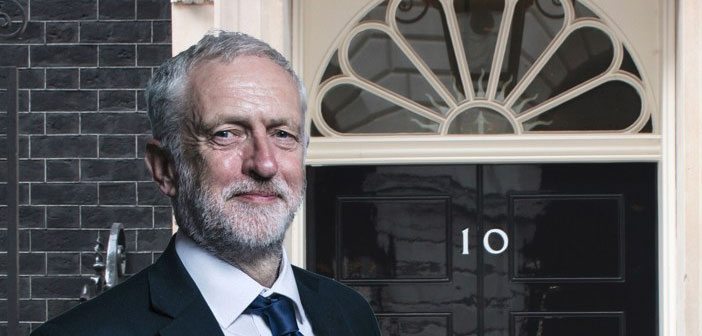This is extracted from Corbyn’s Economic Policy and the Attacks that Lie Ahead, by Tom O’Leary, published in Issue #5 of Transform, a Journal of the Radical Left.
The next election is scheduled for 2022, according to the Parliamentary Fixed Terms Act. There is also continued speculation on some sort of government collapse because of the Brexit negotiations. Therefore the precise timing of the next election is unknown.Across the Western economies the main dividing line is opposition to or support for austerity, and everything that naturally accompanies it, like racist scapegoating. There is an unusual situation in Britain. Jeremy Corbyn is both leader of the party of the left and he is firmly committed to ending austerity. This, and not his ‘secret life as a double agent’ or any other ludicrous claim, is the basis for the relentless and histrionic campaign of the entire ruling class against him, although his internationalism is also anathema. He opposes the main project of the ruling class.
From the perspective of economic policy, the task ahead is to build the Corbynista forces, to participate in their growing militancy on economic and other questions and to address each of the most important aspects of economic policy that arise with the greatest possible clarity.
It is possible to make a detailed examination of Labour economic policy and its likely impact on the economy, even at an unknown point in the future, subject to reasonable caveats on forecasting uncertainty. But it is important to state that this is not the first priority.
The priority is for Corbyn’s Labour to win the next election. That is not certain. He is far from a shoo-in, even though the Tories currently seem incapable of pulling ahead in the opinion polls despite the despicable role played by the Labour right and the entire media, including the BBC.
The campaign against Corbyn is ferocious because, in the first instance he opposes the central economic project supported by the entire British ruling class, which is austerity.
The austerity policy is simply designed to place the burden of the crisis on the shoulders of workers and the poor. It aims to restore profits by driving down wages (often using public sector pay as a battering ram against the entire workforce), while tax cuts for big business and the rich are funded by draconian cuts to public spending. Workers and anyone in receipt of social transfers are directly targeted. The greatest burden is carried by women (who are also subject to new impositions in the home to replace axed public services). Ethnic minorities and recent migrant communities find sharply worsening inequalities in terms of jobs, pay, housing and access to services, from an already low base.
In the nature of the current deep crisis, it is not possible to return to the post-second World War economic consensus in Europe. The long boom of expansion which resulted from first rearmament and then post-war construction is over. Even modest gains for workers and the poor will entail a serious fight with those who are already on the offensive in the opposite direction, in order to restore profitability. There will be no return to a liberal post-war economic consensus for the foreseeable future. Liberalism as a political force is on the way out with that tide.
Instead, the further attacks to come will follow the fierce austerity programmes already implemented. Any left forces hoping to resist even the current attacks have to reject these policies outright.
The Corbyn leadership of the Labour Party does reject all of these policies. In addition, the Labour leadership has forged an economic framework which is a significant advance on the inherited liberal/Christian democrat/social democratic consensus in Britain and Europe of the post-war period.
There is an additional factor in the situation. All governments, in accordance with their capacities try to influence the political situation in other countries in their favour, whether they are allies or enemies. US intervention is not confined to coups in Latin America and wars in the middle east. It stretches to every country. Corbyn’s internationalism should be stoutly defended as it will be an obstacle to further military adventures. But it will undoubtedly provoke anti-Corbyn interventions from the US, Israel and Saudi Arabia, to name but three.
Therefore, the first task is to popularise the Corbyn plan, explaining that investment is the alternative to austerity and that living standards and public services can improve as a result. Crucially, concrete examples and accessible illustrations must be used and repeatedly emphasised with a mass of the population that is otherwise fed a diet of claptrap from the sage economic commentators and the wider media.
The major issue for the economy is undoubtedly Brexit. The plan to sever or curb Britain’s economic links to the European economy would be extremely damaging, leading to higher prices and the re-ordering of supply chains overseas to neutralise the effect of new barriers. Wages will fall and there would be a strong disincentive for any private investment, whether domestic or overseas. The coming offensive on living standards would be deepened and exacerbated.
But the Corbyn leadership of the labour Party is determined to end austerity. It has said it will reject any Brexit deal which hurts jobs or living standards, which practically means aiming for the closest possible relationship to the single market and the customs union. and, despite the frenzy of the ‘centrists’, it is the government that is responsible for the current Brexit shambles, not Corbyn.
If Jeremy Corbyn is not prime minister, he cannot reverse austerity. Nor can he achieve a much better outcome with the EU if he is not in Number Ten. All the other key planks of his administration, such as a foreign policy based on peace and co-operation, or an end to racist scapegoating of migrants, investing in education, or improving wages and public services, would be a dead letter. If he is thwarted or forced out, the entire project will be derailed.
Therefore Corbyn’s economic policy, like all other policies, must first be grasped clearly and used to popularise the project as a whole. There is naturally room for disagreement, and serious disagreement among the Corbyn forces. The economic policy still has many gaps. It may also need to be more ambitious.
But the first task must be to defend his leadership against allcomers, and to fight for a Corbyn-led Labour government.
Read the full analysis in Transform #5. Tom O’Leary is an economist and a regular contributor to Socialist Economic Bulletin.
 Transform: A Journal of the Radical Left
Transform: A Journal of the Radical Left
Issue #5 | November 2018
Includes articles on the continuing economic crisis; how we can tackle the power of big finance; Corbyn’s economic policy; and what we can learn from the struggles against neoliberal globalisation.
Full list of contents and how to buy…

